The messenger arrived breathless, his tunic damp with sweat despite the cool Roman evening. The news he carried would have broken lesser rulers: Roman legions dying by the thousands, not from enemy swords, but from an invisible killer sweeping through military encampments. Meanwhile, in Rome itself, bodies piled in streets as the Antonine Plague claimed victim after victim. Financial resources strained to breaking. Public panic mounting. Military security compromised.
Yet history records that Emperor Marcus Aurelius responded not with panic but with methodical clarity that saved an empire teetering on collapse.
Leadership crises haven’t changed much in the intervening centuries. While you may not face empire-threatening plagues, today’s leaders navigate equally complex territory: market disruptions that threaten organizational survival, unprecedented technological change, talent shortages, geopolitical instability, and stakeholders demanding immediate solutions to problems requiring nuanced approaches.
The weight of decision fatigue crushes modern leaders just as it threatened those of antiquity. The fundamental question remains unchanged across millennia: How does one make wise decisions when every path seems equally treacherous?
Marcus Aurelius—emperor, general, and philosopher—developed a decision-making framework that served him through calamities that would have toppled most leaders. His approach, captured in private journals later published as “Meditations,” offers a surprisingly practical blueprint for contemporary leadership challenges. What makes his wisdom particularly valuable is that it wasn’t theoretical—it was battle-tested through military rebellions, economic crises, personal tragedies, and yes, a devastating pandemic.
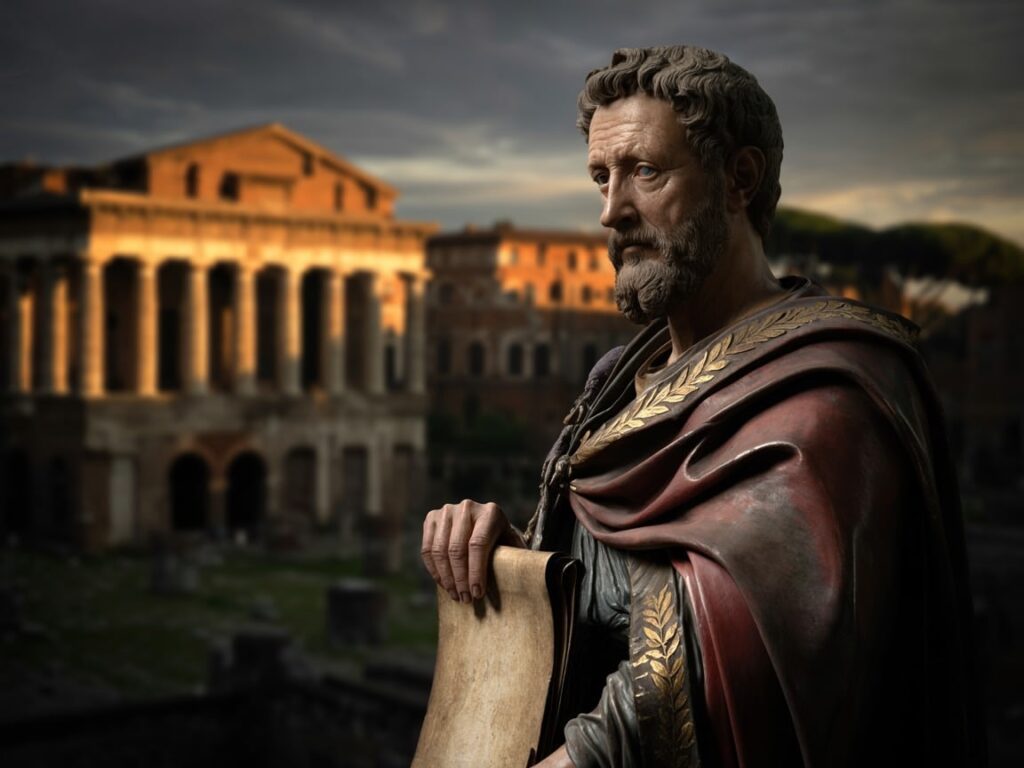
The Leadership Paradox: Why Conventional Decision-Making Fails Under Pressure
Modern leadership often resembles a high-stakes game with constantly changing rules. Traditional decision-making approaches that work admirably during stable periods frequently collapse under extreme pressure. When facing unprecedented challenges, leaders typically default to one of two equally problematic responses: paralysis or impulsivity.
Decision paralysis manifests when the stakes feel too high, the variables too numerous, and the potential consequences too severe. Leaders freeze, delaying crucial decisions while searching for perfect information that will never materialize. Organizations stagnate in this leadership vacuum while competitors advance and problems compound.
The opposite reaction—impulsivity—occurs when pressure triggers reactionary decision-making. Leaders make snap judgments based on emotional responses rather than sound reasoning. These hastily conceived solutions often create cascading problems worse than the original challenge.
Between these extremes lies a more insidious problem: decisions driven by external expectations rather than core principles. Leaders become weathervanes, swinging with prevailing opinions, marketplace trends, or shareholder demands—sacrificing long-term organizational health for short-term appeasement.
Marcus Aurelius recognized these leadership traps nearly two millennia ago. As both philosopher and ruler, he understood that effective decision-making must transcend circumstantial pressures to connect with deeper principles. His approach wasn’t just philosophical musing—it was practical necessity for a leader facing simultaneous crises that threatened Rome’s very existence.
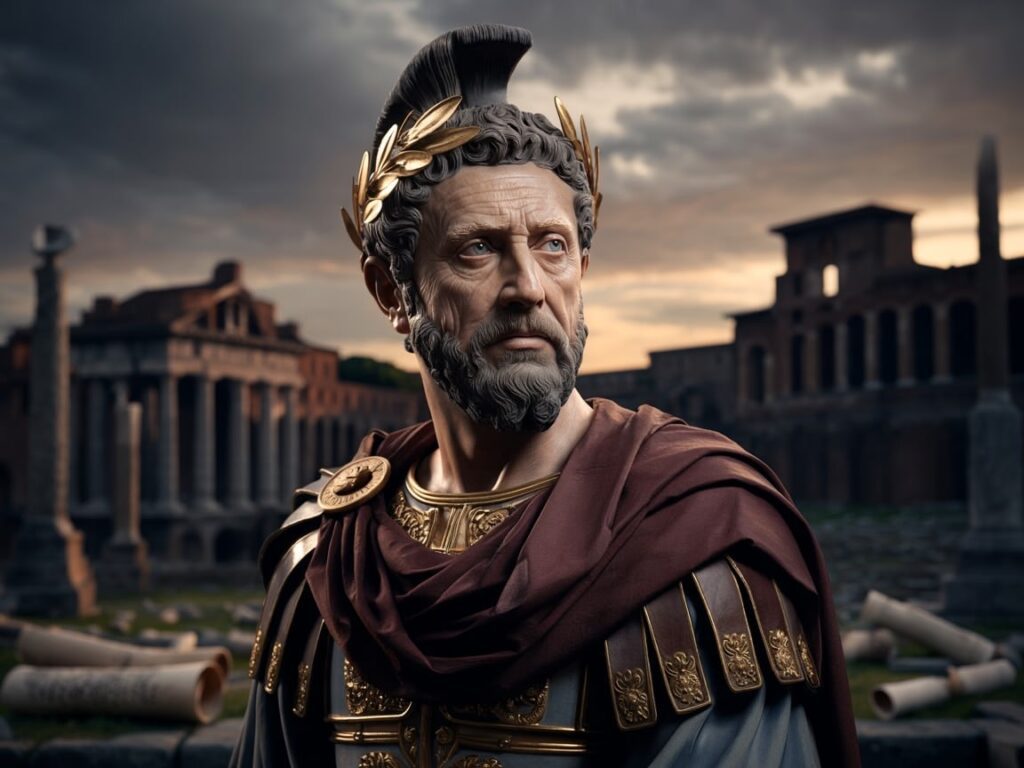
The Stoic Emperor’s Crisis Management Blueprint
When the Antonine Plague devastated the Roman Empire, Marcus Aurelius faced a leadership test few could imagine. Beyond the immediate health crisis, the plague triggered cascading problems: military vulnerabilities as soldiers succumbed to disease, economic disruption as commerce slowed, civil unrest as citizens demanded divine intervention, and political instability as rivals sensed weakness.
Modern scholarship suggests the plague (likely smallpox) killed between 7-10% of the Empire’s population. Imagine facing a crisis that simultaneously threatened every aspect of organizational health—this was Marcus Aurelius’s reality. Yet despite these overlapping calamities, his leadership prevented imperial collapse when many contemporary kingdoms crumbled.
How did he maintain decisiveness amid such overwhelming challenges? The answer lies in his disciplined application of Stoic principles to leadership decisions. Where other leaders became reactive, Marcus remained responsive—a crucial distinction in crisis management.
The frameworks he developed weren’t merely philosophical exercises but practical tools forged in leadership crucibles. They remain remarkably applicable to today’s complex leadership landscape precisely because they address timeless decision-making challenges.
Framework 1: The Dichotomy of Control
At the core of Marcus Aurelius’s decision-making approach was a disciplined focus on the boundary between what he could and couldn’t control. This distinction, which modern psychologists have rediscovered as fundamental to emotional regulation, formed the foundation of his leadership methodology.
“Make the best use of what is in your power, and take the rest as it happens,” he wrote in Meditations. This wasn’t passive resignation but strategic resource allocation. By rigorously separating factors within his control from those beyond it, Marcus avoided wasting precious cognitive and material resources on unwinnable battles.
Consider how this applies to modern leadership challenges. When facing market disruption, competitive threats, or organizational crisis, the variables quickly become overwhelming. Leaders who attempt to control every aspect inevitably spread resources too thin and make poor decisions driven by the illusion of control.
The Stoic approach begins by honestly assessing what aspects of a situation fall within your sphere of influence. This mental discipline prevents the common leadership trap of emotional entanglement with outcomes beyond your control, which clouds judgment and depletes decision-making energy.
To apply this framework to your leadership challenges, try this practical exercise: When facing a complex decision, create two columns. In the first, list all factors you can directly influence. In the second, list those beyond your control. Then ruthlessly focus your decision-making energy exclusively on the first column. This doesn’t mean ignoring external factors—rather, it means accounting for them without becoming emotionally entangled in changing them.
During the plague crisis, Marcus Aurelius couldn’t control the disease itself, but he could control the imperial response: establishing systematic disposal of bodies to limit spread, allocating resources to affected communities, and maintaining public communication to prevent panic. By focusing exclusively on controllable factors, he prevented the decision paralysis that often accompanies overwhelming challenges.

Framework 2: The Premeditation of Adversity
While modern leadership culture often emphasizes positive visualization, Marcus Aurelius practiced what Stoics called “premeditatio malorum”—the premeditation of adversity. This counterintuitive practice involves deliberately visualizing worst-case scenarios not to induce anxiety, but to defuse it.
“Begin each day by telling yourself: Today I shall be meeting with interference, ingratitude, insolence, disloyalty, ill-will, and selfishness,” Marcus wrote. This wasn’t pessimism but preparation. By mentally rehearsing potential challenges, he developed both emotional resilience and contingency plans before crises arrived.
Contemporary leadership research confirms the value of this approach. Studies in cognitive psychology show that pre-experiencing potential failures reduces their emotional impact when they occur and improves responsive decision-making. What Marcus intuited, science now validates.
The practical application for modern leaders involves regular adversity rehearsal. Before major initiatives, deliberately visualize potential failure points. Ask: What could go wrong? What assumptions might prove false? What resources might become unavailable? What stakeholder reactions might undermine our efforts?
This exercise accomplishes several crucial leadership functions. First, it desensitizes you to the emotional shock that often triggers poor reactive decisions. Second, it reveals potential vulnerabilities while there’s still time to address them. Third, it builds organizational resilience by creating contingency plans before they’re needed.
During military campaigns, Marcus regularly contemplated potential defeats, supply line disruptions, and political betrayals. This mental preparation allowed him to respond with measured calm when such events actually occurred, rather than with the panicked reactivity that characterizes unprepared leadership.
Framework 3: First Principles Reasoning
Perhaps Marcus Aurelius’s most powerful decision-making tool was his insistence on stripping situations to their essence—what modern strategists call “first principles thinking.” Rather than reacting to how situations appeared on the surface, he disciplined himself to identify and respond to their fundamental nature.
“If you are distressed by anything external, the pain is not due to the thing itself, but to your estimate of it; and this you have the power to revoke at any moment,” he noted. This isn’t mere positive thinking—it’s a radical commitment to seeing reality clearly by separating objective circumstances from subjective interpretations.
In practice, this framework operates as a mental discipline of continually asking: “What is the actual situation, stripped of interpretation?” When confronting a business setback, leadership challenge, or organizational crisis, the Stoic leader first isolates objective facts from emotional reactions and cultural narratives.
To implement this approach, develop the habit of dissecting challenges into their component parts. When facing a complex decision, identify the essential elements by repeatedly asking “why” until you reach foundational principles. This prevents getting trapped in conventional thinking that addresses symptoms rather than causes.
When Rome’s economy struggled under the dual pressures of plague and military expenditures, Marcus looked beyond surface symptoms to fundamental imbalances in production and consumption. Rather than implementing reactionary policies addressing symptoms, he established structural reforms addressing root causes—including devaluing currency to address debt and creating new commercial incentives.
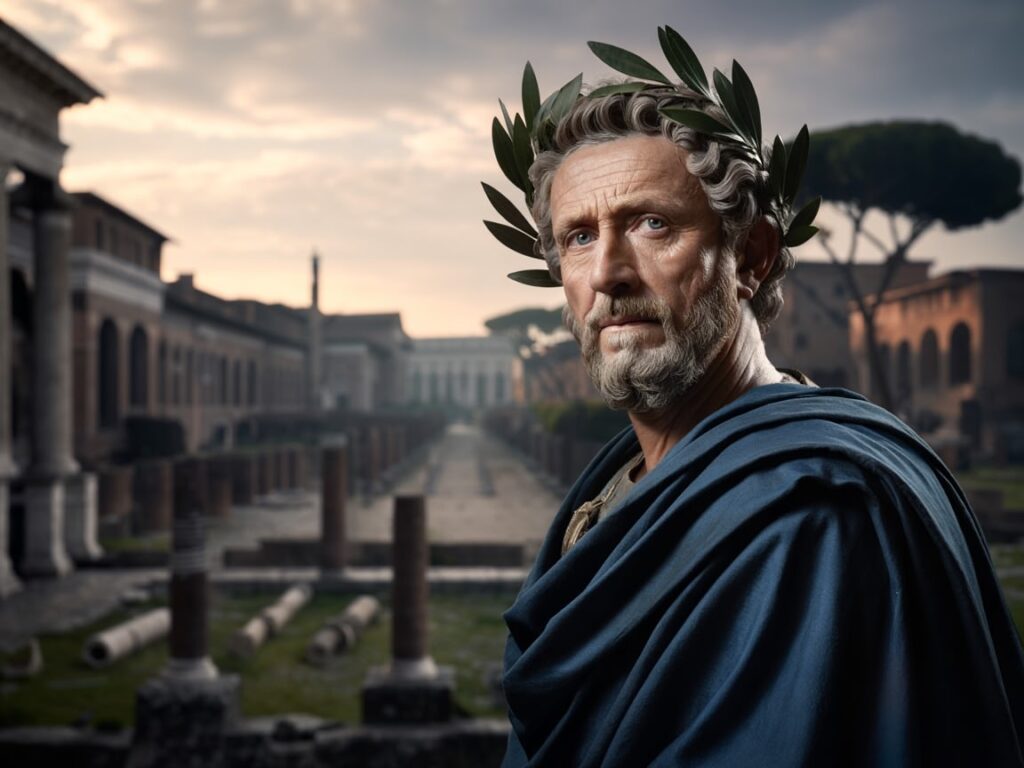
Framework 4: The View From Above
Marcus Aurelius regularly practiced what Stoics called “the view from above”—mentally stepping back to gain perspective on immediate challenges by placing them in broader context. This mental exercise involved visualizing current problems from progressively wider perspectives: organizational, industry, societal, historical, and even cosmic.
“Survey the circling stars, as though yourself were in mid-course with them,” he wrote, describing this perspective-shifting practice. By mentally expanding his viewpoint, Marcus could see immediate crises within broader patterns, avoiding the myopia that afflicts leaders trapped in the urgent present.
This framework operates as an antidote to decision-making distortions caused by proximity. When immersed in crisis, leaders often lose perspective, making reactionary decisions that solve immediate problems while creating larger long-term issues. The view from above restores proportionality and strategic thinking.
To practice this approach, develop a regular habit of perspective-shifting. When facing significant decisions, deliberately consider how the current situation might look from multiple time horizons: a week forward, a month, a year, five years, and beyond. This temporal perspective-taking reveals which aspects of current challenges warrant immediate action and which might resolve naturally with time.
During border conflicts, Marcus would contextualize immediate military setbacks within Rome’s centuries-long expansion and contraction patterns. This perspective allowed him to distinguish between genuinely existential threats requiring full resource commitment and temporary reversals best addressed with measured responses—a distinction that preserved resources and prevented strategic overextension.
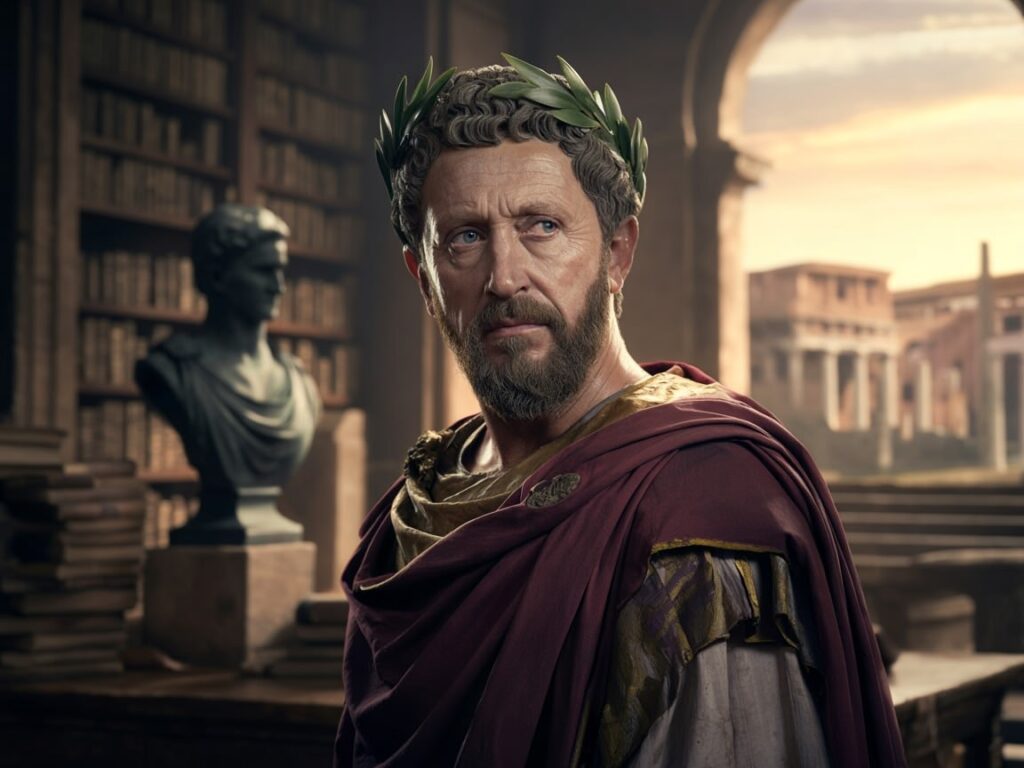
Before Stoic Principles: The Leadership Quicksand
Leadership without philosophical grounding resembles building on quicksand. Decisions become reactive rather than responsive, driven by immediate pressures rather than enduring principles. The symptoms of this leadership approach are painfully familiar in modern organizations: constant priority shifts as leaders chase the latest crisis, cultural whiplash as strategies change with market winds, and eventual team burnout as employees struggle to find meaning in seemingly arbitrary directives.
Without a consistent decision-making framework, leaders become susceptible to cognitive biases that distort judgment. Recency bias elevates the latest information over more relevant but less immediate data. Confirmation bias filters information to support pre-existing beliefs. Sunk cost fallacies perpetuate failed initiatives because of previous investments. The result is a leadership approach characterized by inconsistency, short-termism, and gradual erosion of organizational trust.
This inconsistency affects not just organizational performance but leader wellbeing. Decision fatigue—the deterioration of decision quality after multiple choices—hits hardest when each decision requires building a new framework from scratch. Leaders without philosophical grounding experience higher stress, poorer sleep quality, and increased burnout precisely because they lack consistent principles to streamline decision processes.
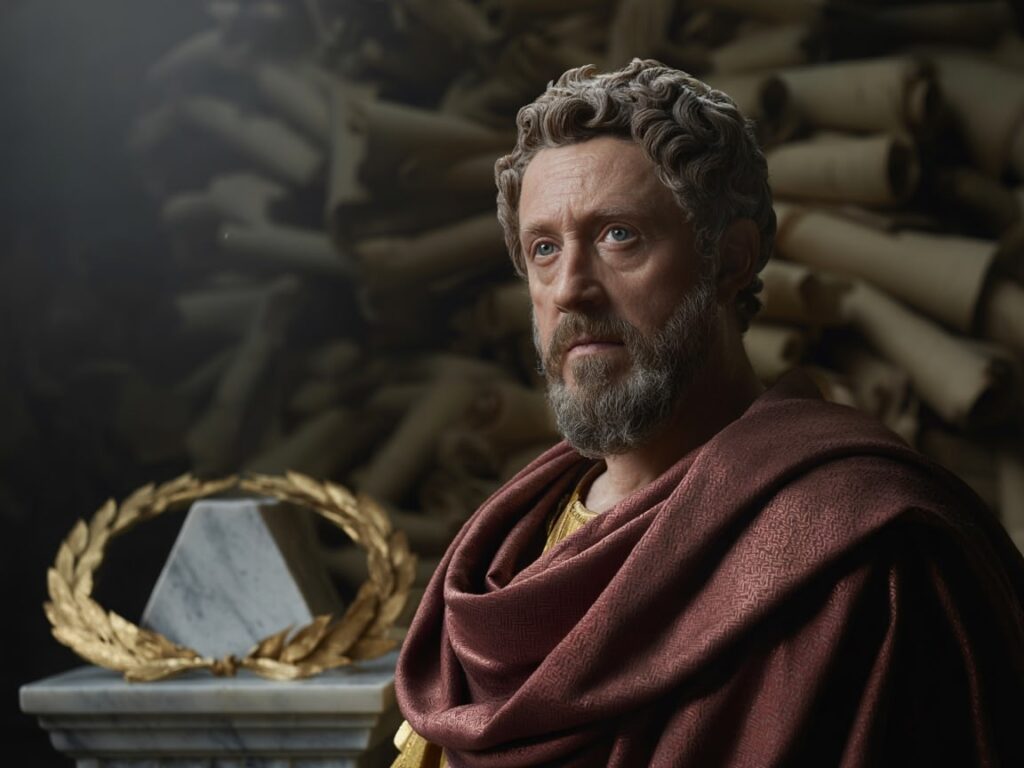
After Stoic Integration: Leadership Clarity
The transformation that occurs when leaders integrate Stoic decision-making principles isn’t merely philosophical—it’s practical and observable. Decision-making becomes simultaneously more efficient and more effective. Efficiency improves because established principles eliminate the need to rebuild decision frameworks for each new challenge. Effectiveness improves because decisions align with consistent values rather than responding to transient pressures.
The organization experiences this transformation as leadership consistency. Even when facing novel challenges, the leader’s approach remains recognizable and trustworthy. This consistency builds organizational resilience by creating predictability amid change—team members understand the principles guiding decisions even when specific circumstances are unprecedented.
For the leader personally, this transformation manifests as reduced decision fatigue and increased confidence. Difficult choices remain difficult, but the framework for addressing them becomes clearer. The internal questioning that plagues many leaders—”Am I making the right decision?”—transforms into the more productive question: “Am I applying our principles correctly to this situation?”
This shift from reactive to principled leadership doesn’t eliminate challenges, but it fundamentally changes how they’re experienced. Challenges become opportunities to apply and refine principles rather than threats to organizational stability. This perspective shift alone dramatically improves leadership performance under pressure.
The Bridge: Implementing Aurelius’s Frameworks in Modern Leadership
The practical application of Marcus Aurelius’s decision-making frameworks begins with their integration into regular leadership practice. Like any skill set, they require deliberate application before becoming intuitive. Begin by selecting one framework that addresses your most pressing leadership challenge and commit to applying it consistently for 30 days.
For leaders struggling with overwhelm, start with the Dichotomy of Control. Before each significant decision, explicitly identify factors within and beyond your influence. This single practice can dramatically reduce decision fatigue by eliminating unproductive worry about uncontrollable variables.
For those facing uncertainty, implement the Premeditation of Adversity. Schedule weekly sessions to identify potential challenges in major initiatives. This proactive approach builds organizational resilience while reducing the emotional impact when setbacks occur.
For leaders navigating complexity, practice First Principles Reasoning. When confronting multifaceted problems, discipline yourself to identify fundamental elements rather than addressing surface symptoms. This prevents the common trap of implementing solutions that fail to address root causes.
For those making high-stakes decisions, regularly employ the View From Above. Consider how current challenges might appear from multiple time horizons and organizational perspectives. This contextualizes immediate pressures within longer-term patterns, preventing short-sighted decisions that create future problems.
The integration of these frameworks isn’t sequential but iterative. Begin with the approach most relevant to your current challenges, then gradually incorporate others as they become relevant. The goal isn’t philosophical purity but practical effectiveness—use these tools as they serve your leadership needs.
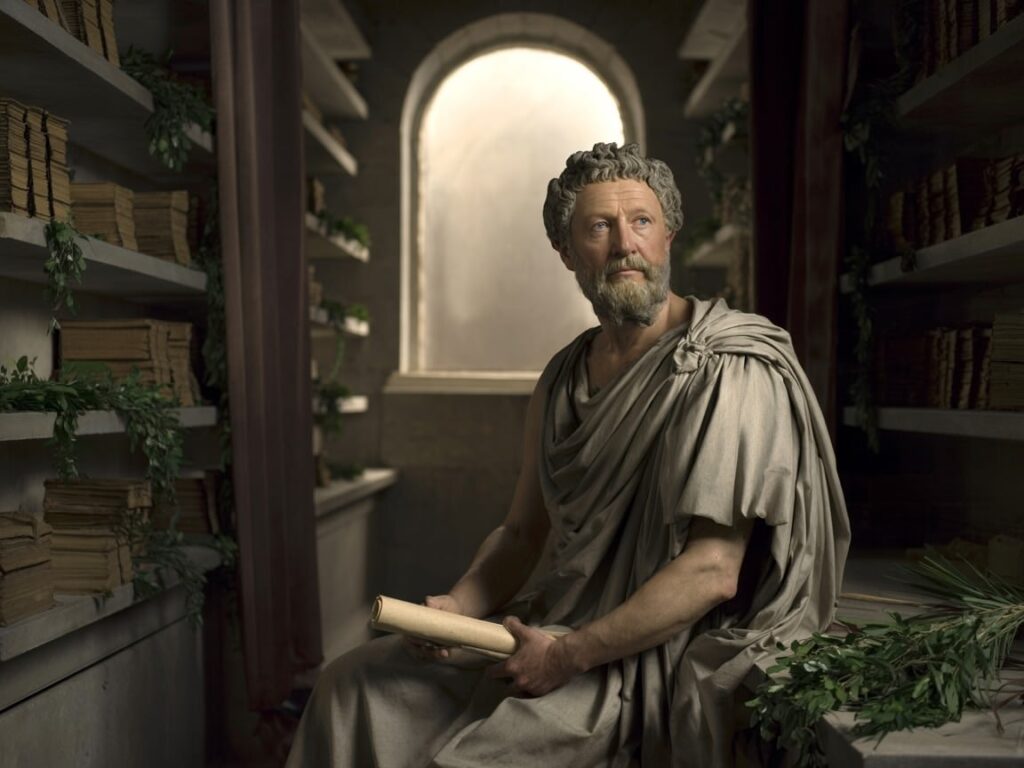
Developing Your Leadership Philosophy: A Reflective Exercise
Marcus Aurelius didn’t adopt Stoicism wholesale—he adapted philosophical principles to address his specific leadership challenges. Your leadership philosophy should similarly reflect your unique context, challenges, and values. The following reflective exercise helps develop this personalized approach:
First, identify three to five recurring leadership challenges you face. These might include decision-making under uncertainty, balancing competing stakeholder demands, maintaining strategic focus amid tactical pressures, or navigating organizational politics. Be specific about the patterns that repeatedly challenge your leadership effectiveness.
Next, consider which of Marcus’s frameworks might address each challenge. The Dichotomy of Control helps with boundary-setting and resource allocation. The Premeditation of Adversity builds resilience for high-uncertainty environments. First Principles Reasoning addresses complexity by identifying fundamental elements. The View From Above provides perspective when immediate pressures distort priority-setting.
Finally, develop personalized applications of these frameworks for your specific leadership context. How might you implement the Dichotomy of Control in your weekly planning routine? What would the Premeditation of Adversity look like in your industry’s specific risk landscape? How could First Principles Reasoning reshape your approach to recurring organizational challenges?
Document these reflections as the foundation of your leadership philosophy—a set of principles and practices that guide decision-making across varying circumstances. Revisit and refine this document quarterly, adding insights gained through application and adjusting approaches that prove less effective in your specific context.
The Timeless Relevance of Philosophical Leadership
What makes Marcus Aurelius’s approach enduringly relevant isn’t historical curiosity but practical utility. The fundamental leadership challenges he faced—uncertainty, complexity, competing priorities, and limited resources—remain unchanged across centuries. The psychological pressures these challenges create—decision fatigue, cognitive biases, and emotional reactivity—are likewise consistent across time.
Contemporary leadership science increasingly validates what Marcus intuited through philosophical reflection and practical application. Modern decision science confirms the value of separating controllable from uncontrollable factors. Cognitive psychology validates the effectiveness of pre-experiencing potential failures. Strategic thinking emphasizes the importance of first principles reasoning in complex environments.
The integration of philosophical principles with leadership practice doesn’t replace technical expertise or industry knowledge—it complements them by providing a framework for their application. Technical skills determine what can be done; philosophical principles guide what should be done and why.
In a business environment characterized by accelerating change, leadership anchored in timeless principles provides stability amid transformation. While specific challenges evolve, the fundamental questions of leadership remain remarkably consistent: How do we allocate limited resources? How do we balance competing priorities? How do we maintain clarity amid complexity?
Marcus Aurelius’s enduring gift to modern leaders isn’t specific solutions but a methodology for developing them—an approach to decision-making that remains effective across radically different contexts. His frameworks offer not historical artifacts but living tools for contemporary leadership challenges.
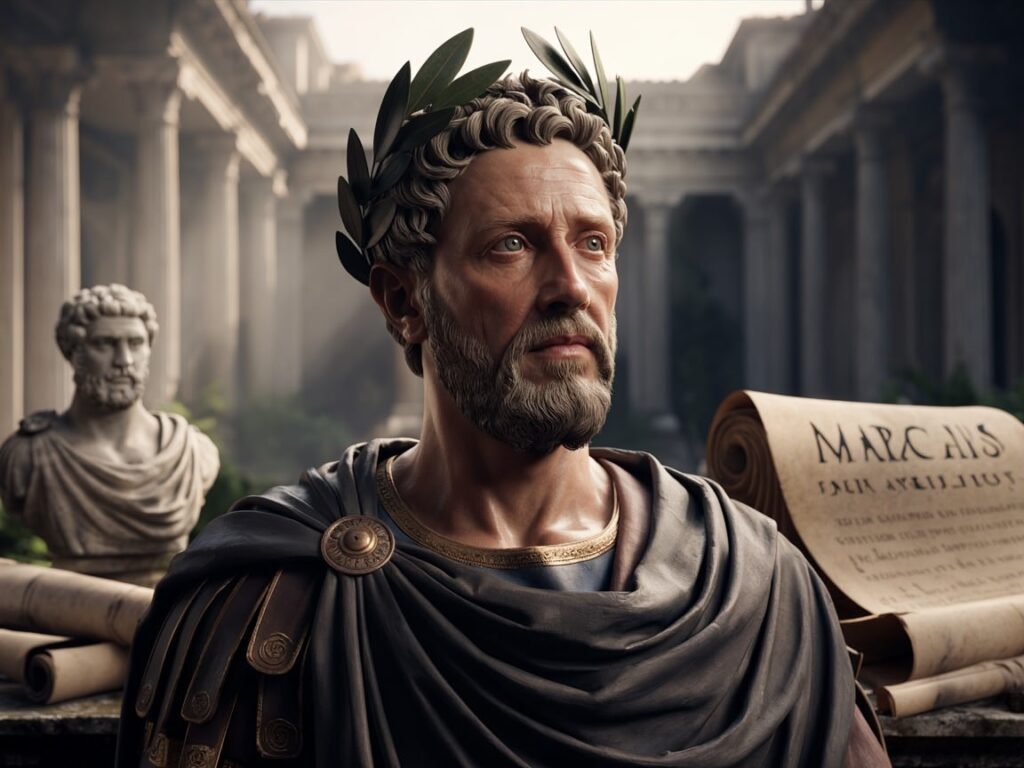
From Ancient Wisdom to Modern Application: Your Next Steps
Leadership transformation doesn’t occur through intellectual understanding alone but through consistent application. The journey from knowing Marcus Aurelius’s principles to embodying them in your leadership requires deliberate practice and reflection.
Begin by selecting the single framework most relevant to your current leadership challenges. Rather than attempting comprehensive implementation, focus on mastering one approach before expanding to others. This targeted application prevents the overwhelm that often accompanies philosophical integration.
Schedule regular reflection on your implementation experience. What aspects of the framework prove most valuable? Where do you encounter resistance? How might you adapt the approach to better fit your specific leadership context? This reflective practice transforms theoretical understanding into practical wisdom.
Consider creating accountability through shared practice. Identify colleagues interested in philosophical approaches to leadership and establish regular discussions of application experiences. This community of practice accelerates learning while providing support through implementation challenges.
Finally, document your evolving leadership philosophy. As you integrate Marcus’s frameworks with your existing approaches, capture the resulting principles and practices. This documentation serves both as reference during decision-making and as teaching material when developing other leaders.
Marcus Aurelius never intended his private journals to become leadership manuals—they were personal reflections on his own leadership journey. Yet their enduring value lies precisely in their authenticity as real-time documentation of a leader struggling with universal challenges. Your leadership philosophy, similarly, gains value not from theoretical perfection but from practical application in the face of genuine challenges.
The question isn’t whether ancient wisdom remains relevant to modern leadership—it’s how effectively we translate timeless principles into contemporary practice. Marcus Aurelius’s frameworks offer a starting point, but their true value emerges only through your thoughtful application to the leadership challenges you face today.
What decision will you approach differently tomorrow?

